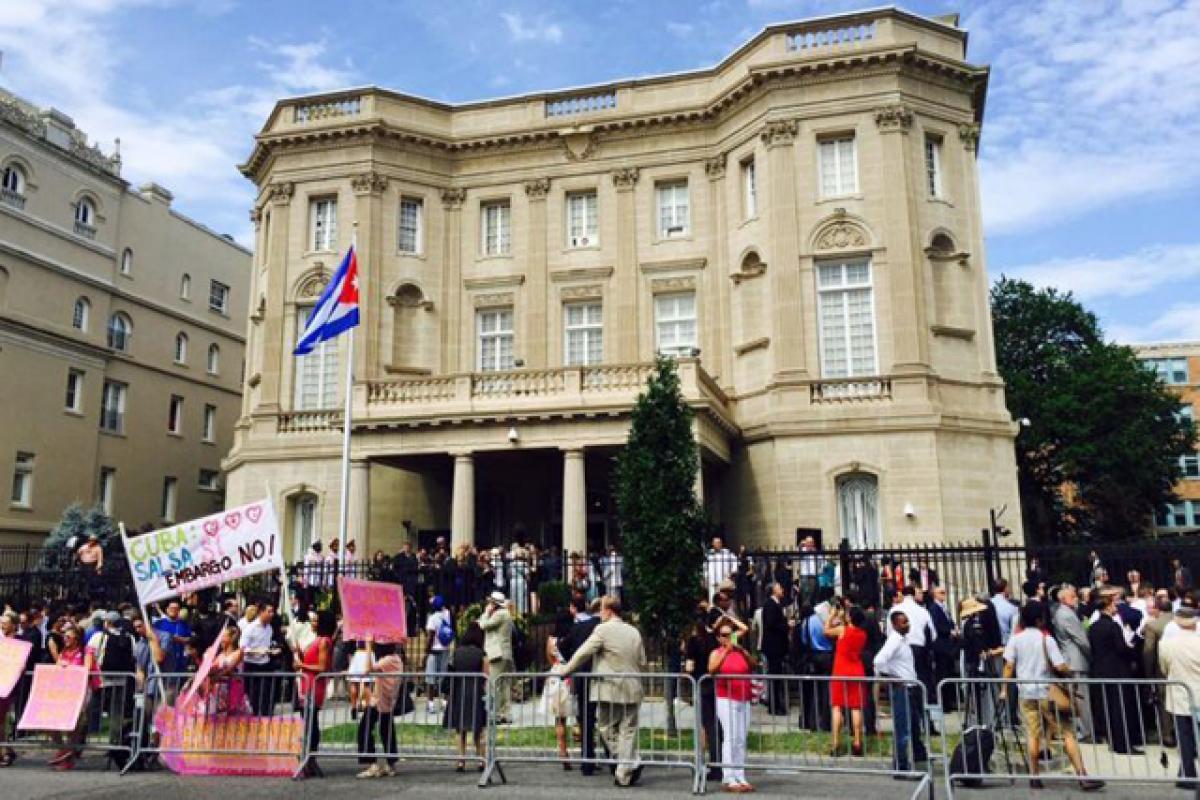Live
- Over 7,600 Syrians return from Turkiye in five days after Assad's downfall: minister
- Delhi BJP leaders stay overnight in 1,194 slum clusters
- Keerthy Suresh and Anthony Thattil Tie the Knot in a Christian Ceremony
- AAP, BJP making false promises to slum dwellers for votes: Delhi Congress
- 'Vere Level Office' Review: A Refreshing Take on Corporate Life with Humor and Heart
- Libya's oil company declares force majeure at key refinery following clashes
- Illegal Rohingyas: BJP seeks Assembly session to implement NRC in Delhi
- Philippines orders full evacuation amid possible volcanic re-eruption
- Government Prioritizes Welfare of the Poor, says Dola Sri Bala Veeranjaneyaswamy
- Two Russian oil tankers with 29 on board damaged due to bad weather
Just In

Re-bonding of US, Cuba imperative for peace. The unfurled Cuban flag at the State Department building in Washington between the flags of Croatia and Cyprus at midnight on 20th July, 2015, followed by the opening ceremony of the Cuban embassy in Washington, marks the end of broken diplomatic ties between the two countries.
The joint efforts of President Obama and his Cuban counterpart Raul Castro in the direction of normalisation of relationship between the capitalist super power US and the tiny island nation of Communist Cuba are in the interests of peace and harmony in the world
The unfurled Cuban flag at the State Department building in Washington between the flags of Croatia and Cyprus at midnight on 20th July, 2015, followed by the opening ceremony of the Cuban embassy in Washington, marks the end of broken diplomatic ties between the two countries. Diplomatic ties between the two countries were snapped during the regimes of Dwight Eisenhower of the USA and Fidel Castro of Cuba in 1961.
.jpg)
The joint efforts of President Obama and his Cuban counterpart Raul Castro in the direction of normalisation of relationship between the capitalist super power US and the tiny island nation of Communist Cuba are imperative in a historical context and also in the interests of peace and harmony in the world.
The Cuban Foreign Minister, Bruno Rodriguez, the first time visitor to Washington/US was at the centre-stage of the opening ceremony of the Cuban embassy in Washington. It was a very emotional event for the Cuban side. The low key affair of the opening ceremony of the Cuban embassy in Washington was headed by Roberta Jacobson, US Assistant Secretary of State.
The US embassy business in Havana will be carried out by Jeffrey DeLaurentis, the present Chief of the US Mission at the Havana ‘Interest Section’ for the present. He will be promoted as Charge d’ Affairs until a full-fledged embassy gets inaugurated, perhaps by John Kerry, the US Secretary of State, on 14th August of this year. As and when his happens, Kerry will be the first Secretary of State to visit Cuba after seven decades.
The White House seems to be disinclined for the present either to open a full embassy in Havana or to nominate its ambassador to Cuba largely because of strong opposition to such measures by the Republicans who control both the Houses of the American Congress and the powerful Cuban American lobby under the leadership of Marcus Rubio, the Florida Senator, and also a Republican aspirant for Presidential nomination in 2016.
The rapprochement between Obama and Raul Castro is the result of carefully crafted negotiations initiated by the Argentine Pope for about two years in collaboration with the Canadian government. The December 17, 2014 historic announcement by President Obama in respect of the rapprochement has had a smooth sail so far regarding the removal of Cuba from the list of ‘terrorist states,’ relaxation of travel restrictions of people between the two countries and exchange of prisoners in a selective manners so far.
But the continued detention of Alan Gross, a US contractor for International Development, in a Cuban prison on espionage charges seems to be a stumbling block for the process of normalisation between the two countries. The complex issue of the properties belonging to the US citizens nationalised by the Cuban government in 1960 is yet another tricky problem.
Moreover, US Republican leaders tend to suspect the bona fides of both the Cuban government and its people because of their long association with the Communist ideology. As far as Cuba is concerned, its post-revolutionary generation seems to be very jubilant at the inauguration of its embassy in Washington, and also anticipates a similar development in Havana at the earliest.
Raul Castro at 83, as an important architect of the Cuban Revolution of 1953-59 in the company of Fidel Castro and Che Guevara, is sufficiently seasoned and mature to tackle and negotiate any eventuality in directing the new destiny of the nation in a positive manner in the larger interests of Cuba.
The desperate search of the new generation of post-revolutionary Cuba for ‘light’ at the end of their tunnel journey deserves realisation in the larger interests of peace and ‘historic re-bonding between Washington and Havana.’ (The writer, a former Professor of English, Kakatiya University, Warangal, is currently engaged in research in Latin American Studies)
By Indrasena Kancherla

© 2024 Hyderabad Media House Limited/The Hans India. All rights reserved. Powered by hocalwire.com







